Episodes
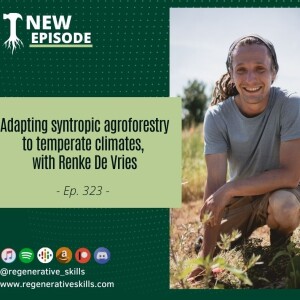
Friday Dec 15, 2023
Friday Dec 15, 2023
Syntropic Agroforestry has exploded in popularity and interest in the last few years. I’ve explored this agroforestry design and management system a little in some previous episodes with my friend Jacob Evans, but there’s so much more to explore.
First pioneered by renowned farmer Ernst Gostch in Brazil, his integrated approach of dense planting and timed pruning and intervention to accelerate natural succession and replace outside inputs for both ecosystem regeneration and nutrient dense food production has sparked an interest in many people to adapt the concepts to their own climates and contexts.
From what I’ve heard however, adapting syntropic methods to temperate climates has proven more difficult than many people originally thought. The plants that thrive in these latitudes have different growth cycles with their long dormant period and many compete for light more than their tropical counterparts. Luckily I was able to find someone who has not only studied with Ernst closely in Brazil, but has also been pioneering syntropic systems in Germany who was able to share some key learnings from the first couple years of trial. Renke de Vries studied International Forest Ecosystem Management, and works as an agroforestry designer and consultant and in arboreal maintenance. From 2019 till 2023 he has been responsible for the design, establishment and management of syntropic agroforestry systems especially at Gut and Bosel, the famous farm in Brandenburg outside of Berlin in Germany. In this interview we go into the learnings that he brought from his formal studies in forestry and forest management and how they juxtapose with his learnings from Ernst in Brazil.
We also dig into the systems that he has been designing and planting and the crucial learnings in his ongoing attempts to use syntropic principles in temperate climates. Though there is still so much to learn and experiment with, I’ve been very interested to see the different iterations of what I’m convinced are very wise and widely applicable principles of ecological management from the syntropic concept. Hopefully this discussion will spark some interest in some of you to start your own agroforestry experiments.
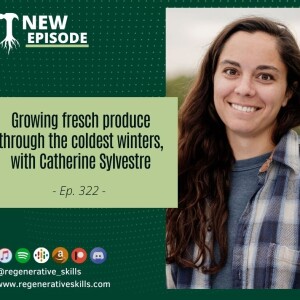
Friday Dec 08, 2023
Friday Dec 08, 2023
I’ve been so happy to see how popular the concept of growing one’s own food has become in recent years. Especially since the pandemic, a lot of us have connected deeply with the need to build food resilience by cultivating our own gardens, and quite a few have even gone further and started to grow at a market scale.
It’s a beautiful thing to be able to eat fresh healthy produce from your own land, but I’ve often wondered as well, how we can cross the long dark and cold period of winter, when fresh local veggies are tough to come by. Though there are quite a few volumes about season extension in the garden, I had never really come across anyone who was actively planting for deep months of winter, and so I was thrilled when I found that New Society publishers were putting out a whole book on exactly this subject. Building on years of research, experimentation, and collaboration, and co authored by Catherine Sylvestre and Jean Martin Fortier “The Winter Market Gardener” is a beautifully illustrated practical guide to winter vegetable production for small farmers growing in northern climates.
I got to speak with Catherine Sylvestre who is a professional agronomist and director of vegetable production and leader of the market garden team at la Ferme des Quatre-Temps (The Fours Seasons Farm) in Quebec, Canada. She develops, implements, and teaches best practices for cold-season growing, specializing in crop protection and greenhouse production for northern climates.
In this episode we cover just about every focus in this very complete book, from where the interest and research into winter growing started, sources of knowledge and inspiration for their ongoing experiments into winter growing, strategies and season planning, and even sales and marketing advice for the off-season produce. Catherine also gives crucial advice on the very practical side for things like structures and season extension tools, greenhouse heating devices, disease and pest protection, harvesting and cold storage, and even lists of plants that have grown well for them as well as those which have struggled. This episode could very well be the key to extending your home production of fresh veggies, whether at home or in a market garden, for the entire year, so you may want to have a notebook for this one and follow the link in the show notes to get your own copy.
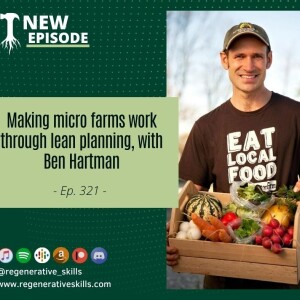
Friday Dec 01, 2023
Friday Dec 01, 2023
I’ve been observing an interesting trend in the regen ag space. The concept and awareness of regen ag has been growing exponentially with many people exploring ways to start their own farms and to participate in and support those who are already involved. At the same time the current economic situation and the complexity of regulations, paired with skill worker shortages, and other challenges are leading people to burn out or quit altogether.
It’s no joke how complex and difficult it can be to run a lean and profitable farm in modern times. Luckily there are some successful and experienced farmers out there who are helping to train and inform the new generation in order to support them in getting established.
One voice in particular who I’ve admired since the release of his first book, The Lean Farm, is Ben Hartman. Though they both have a lot of experience from running their previous large scale operation, Ben along with his wife Rachel started their new venture, Clay Bottom Farm which is an urban farm, set on the north edge of Goshen, IN, in 2006. One of their key features is that all of their food is sold within 1.5 miles of the farm.
Ben is best known for bringing the Lean methodology pioneered in factory manufacturing, to the management and process on small farms. He now has a new book out titled The Lean Micro Farm: How to Get Small, Embrace Local, Live Better, and Work Less.
In this interview Ben shares his story of his initial passion for farming and the journey to creating a simplified and efficient operation that allowed him to enjoy a life with his family and still have hobbies while running a profitable farm.
We discuss the criteria he uses from the Lean system to design workflows, focus energy on the tasks of highest return, and eliminate unnecessary work.
We also go into the practical details of this ⅓ of an acre operation such as the tools he uses, his method for bed flipping in the market garden, the marketing and sales system he has, and the infrastructure that makes it all flow smoothly.
This episode is packed with advice for growers who are looking to get small by reducing complexity and waste without compromising profitability or losing their customer base.

Friday Nov 24, 2023
Friday Nov 24, 2023
We live in a time when everyone seems to be looking for high tech solutions for every problem. Maybe it's due to all of the new tech that has come out in recent decades with lofty promises of new frontiers, or the fact that so many of us are removed from regular interaction with the natural world, but I genuinely believe that technology is more over-applied and responsible for more problems than it usually solves. For that reason I always like to see when professionals advocate for low tech solutions and a return to basics and analog methods, especially when working with nature.
Today I have the pleasure of introducing two guests whose work I’ve admired for a while and who co teach a online course called low tech erosion control which focuses on the approach and techniques that are approachable for almost everyone to reverse and regenerate landscapes suffering from water erosion.
First up, there’s Jeff Adams, who is owner/operator of TerraSophia LLC, a watershed restoration and landscape contracting firm based in Moab, UT. He has a depth of experience in permaculture, watershed rehabilitation, water harvesting, erosion control, and educational programs. With over 20 years of field experience, Jeff brings a practical and integrated approach to each project and course he does.
Along with him we’re joined by Neil Bertrando, a regenerative specialist who has focused on integrated water harvesting, agroforestry systems, homestead production gardens with season extension, medicinal pollinator habitats, and ecological restoration for over 12 years. He has been a permaculture instructor at OSU since 2014. He holds degrees in Biology and Environmental Science and owns an ecological design and education firm, RT Permaculture, specializing in effective and regenerative landscapes.
Together we start by digging into each of their unique paths into working in ecological restoration in the American Southwest and the Great basin regions. They each describe the challenges of their climate and context as well as the historical and current sources of degradation of the surrounding ecology that is often behind the restoration project where they work.From there we systematically walk through the site assessment process of reading the landscape and understanding the local ecology to begin the project design.
Both Jeff and Neil describe the ways they develop a plan of action including the information they gather and how they assess different implementation strategies, especially from the low tech options and working with materials found on site.
We also talk about one of my favorite and often overlooked aspects of project design, which is the maintenance and revision strategies over time, as well as how to design with them in mind. This discussion is full of practical advice that you can use to get started on your own watershed restoration project at a manageable scale,
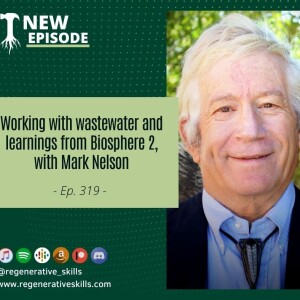
Friday Nov 17, 2023
Friday Nov 17, 2023
I’ve been lucky in recent months to be able to speak to people who’ve been leaders and change makers in the regenerative space for a significant amount of time. Building on that knowledge and experience I got to speak with Dr Mark Nelson.
Mark is Chairman of the Institute of Ecotechnics, head of Wastewater Gardens International and has worked for several decades in closed ecological system research, bioregenerative space life support, ecological engineering, restoration of damaged ecosystems, desert agriculture and wastewater recycling. Notably, Dr. Nelson was a member of the eight person “biospherian” crew for the first two year Biosphere 2 closure experiment, 1991-1993.
The project included pioneering regenerative agriculture and waste and water recycling. Even before that, in the 1970s, he planted an organic fruit orchard at Synergia Ranch, Santa Fe NM and has helped manage its organic fruit and vegetable farm for decades.
As Associate Editor of Life Sciences in Space Research, he is also an author and contributor for numerous books including “Pushing Our Limits: Insights from Biosphere 2”, “The Wastewater Gardener: Preserving the Planet One Flush at a Time” (2014), and “Life Under Glass: Crucial Lessons in Planetary Stewardship” (2020) by Mark and two fellow biospherians.
I first planned out this interview withMark to focus on his work with wastewater management and gardening, but I quickly realized that it was only a small part of the work and experience in his expertise.
As a result, we cover a lot of ground in this session ranging from the work and development on the Biosphere 2 installation and what it was like being part of the research team who lived there for two years.
Mark talks about his work and learnings from decades of international ecological projects including those focused on wastewater management and how all these diverse places and contexts continue to inform the Ecotechnics initiatives.
We also get around to focusing on his book “The Wastewater Gardener: Preserving the Planet One Flush at a Time” published by Synergetic Press. There we dissect the key considerations for safe harvesting and reuse of wastewater and the potential uses of it in gardens and beyond. Making use of wastewater is becoming more and more essential as the energy intensive and expensive methods of purification are quickly becoming unfeasible. Though people are becoming aware of this necessity and its potential it’s still going to require a lot more visibility to be adopted at the scale that is needed, so I hope that episodes like this will act as a catalyst to get more listeners like yourselves to consider how using waste water might fit into your own projects.
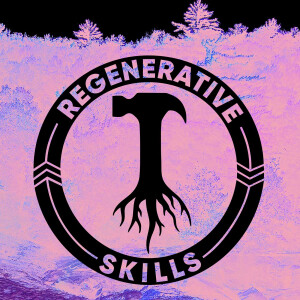
Friday Nov 10, 2023
Friday Nov 10, 2023
A few months back when I covered the topic of landrace gardening and crop breeding, I had no idea what a passionate and knowledgeable community around the world that I was tapping into.
The seed savers and plant breeders who I’ve been in touch with, including quite a few who are part of the Discord community for this podcast, are working on everything from quinoa crosses for tough climate staple crop production, to the domestication of silverweed, adapted varieties for low maintenance, and so much more. For the most part though I’ve been coming across people who are doing this in their backyards and only occasionally on farms. It made me wonder if there was real potential in bringing heritage seed varieties and landrace breeding into larger operations and if it was even feasible at a large scale. Luckily, Joseph Lofthouse passed me the contact of Glenn Roberts promising that I wouldn’t regret reaching out to him and learning about the work he’s doing at Anson Mills.
Glenn Roberts founded Anson Mills in 1998 in Charleston, South Carolina, with the vision to rematriate lost foods of the 18th and 19th century Southern Pantry. Today, Anson Mills grows and produces artisan organic landrace grain, legume and oilseed ingredients for chefs and home cooks worldwide, and provides pro bono culinary research support for chefs, pastry chefs, bakers, brewers and distillers through AM Research Labs. Anson Mills provides pro bono seed biosecurity for the growing community of Southern organic place-based identity preserved landrace crop farmers. Glenn is the recipient of the USA Artisan of the Year and National Pathfinder Awards, a founding member of the Carolina Gold Rice Foundation and a pro bono consultant to the Board of Advisors, Stone Barns Center.From that bio, you can see that I hit the jackpot in my search for production scale farms working on landrace growing projects.
Beyond the work he’s most known for though, Glenn is a very multifaceted and multi talented individual in many other fields which he describes at the beginning of the episode.
From there he took me through his journey of rediscovering Carolina Golden Rice, a heritage variety that he knew from his childhood but which had been all but lost by the time he grew up. Glenn also gave me a window into the process of reviving an endangered seed and food variety as well as the incredible network of people around the world studying and working on these challenges.
We also explore the culture that is connected to our traditional foods and how reviving lost genetics is about so much more than putting a different type of seeds in the ground, but rather rediscovering how to grow these strains and the management of the land and even community that is involved in caring for this food.
There are so many fascinating stories and ideas in this interview that open up the world and potential of landrace growing as well as a huge network and collection of resources that Glenn and his collaborators have created for those of you who might be interested in getting involved and assisting in these efforts so I really encourage you to listen through to the end on this one and to check out the links and resources in the show notes for this episode on the website as well.
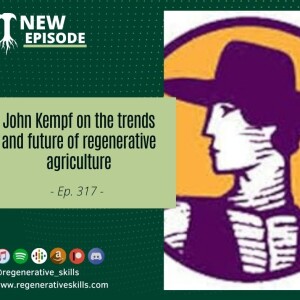
Friday Nov 03, 2023
Friday Nov 03, 2023
My guest today needs no introduction if you’ve been paying attention to the regen ag scene in the last decade, but just in case you’re new to this topic and community let me catch you up to speed
John Kempf is an entrepreneur, speaker, podcast host and teacher. He is passionate about the potential of well managed agriculture ecosystems to reverse ecological degradation.
It is John’s mission to have these regenerative models of agriculture management become the mainstream globally by 2040.
In addition to being a grower, John is the founder of Advancing Eco Agriculture, Crop Health Labs, Ozadia, and the Regenerative Agriculture Academy. He hosts the Regenerative Agriculture Podcast, where he interviews top growers and scientists about the principles and practice of implementing regenerative agriculture on a large scale.
I had John on the show twice now and in the first conversation I didn’t know much about him or his work and so we covered many of the softball questions about things like the definition of regen ag and its importance in a new ecological food system. Since then I’ve become an avid listener of his podcast and have a much better understanding of just how important his work and that of his companies have become in leading the way in this scene. As a result I wanted to explore some of the deeper questions that very few people have enough of an overview of this movement to be able to see, and that’s exactly what we cover in this session. Together John and I navigate where regen ag is in this current moment and the drivers that have brought it this far. John reflects on the patterns and learnings from the vast clientele of AEA about the commonalities and characteristics of successful farmers who’ve transitioned to regenerative management as well as those of the coaches and consultants that are effective in assisting them in their journeys.
We also look into the influences outside of farming directly, the external factors that set boundaries on producers from the large food companies, retail outlets, commodities trade, investors, and politicians that wield so much power. Since John’s work is already one of my go-to sources for information on the newest innovations and state of progress for regen ag, it was a unique pleasure to be able to gain insight into his vantage point and strategy on how to bring this movement forward further.

Friday Oct 27, 2023
Friday Oct 27, 2023
Despite the popularity of regenerative agriculture at the moment and the fact that there are many inspiring farmers involved in the movement, it’s still rare to find experienced farmers, especially in large scale operations that have been working to regenerate their ecosystems and communities for more than 20 years.
For this reason I was thrilled to connect with Will Harris of White Oak Pastures for a second time to dig into the remarkable career he’s had and the journey of transforming his farm into one of industrial beef production to a holistically managed multi-species farm that has been a beacon of the potential of regen ag in his region. For those of you who didn’t catch the first episode I recorded with him, Will Harris is the owner of White Oak Pastures, in Georgia’s semi-tropical Coastal Plain. Described by his daughters as an “organic icon” of the Real Food movement, he is one of the very first people to bring grass-fed and humanely raised meat to the mainstream. Harris is one of the most outspoken critics of industrialized, centralized, and commoditized agriculture and is one of the most recognized leaders in the regenerative and resilient agriculture space.
In this episode we focus on the new book that he’s just published titled A Bold Return to Giving a Damn: One Farm, Six Generations, and the Future of Food.
We start by talking about the origins of his family’s tenure on the farm almost 150 years ago and how management and practices changed through the generations.
From there Will shares his personal journey from following in the footsteps of his father who was a skilled industrial cattleman, to his awakening that gradually began to transform the way the farm was run.
Along the way the town of Bluffton, GA where they’re located began to change and grow along with them and we discuss the role that White Oaks played in the revitalization of the community.
We also cover a wide range of insights from Will’s career from the challenges and hurdles that have been working against their vision from the political and industrial forces in the food system in the US, to points of hope and inspiration that make the difficulties worthwhile.
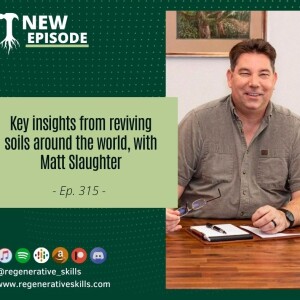
Friday Oct 20, 2023
Friday Oct 20, 2023
Though we’ve covered many aspects of soil health on this show in previous episodes, this is an area of scientific and agronomic study which is constantly growing and evolving. It seems that there are a growing number of specialists who are pioneering research in very specific and detailed aspects of soil health which helps to expand our overall picture of the ecosystem under our feet.
At the same time it’s essential to be able to translate all of this advanced biology, chemistry, and even physics into information that someone from outside of academia can translate into action on the land and a soil care and fertility strategy. Thanks to another great recommendation and connection from my friend Anja at Soilify, I was put in contact with Matt Slaughter to explore this kind of practical information. For 20 years Matt has been helping farmers around the world understand their soil microbiology and finding ways to help them "bring soil back to life".
He is the Founder, President and Laboratory Director of Earthfort where he’s primarily focused on customer support through consultation and education, but is also responsible for product research and development. As the creator of Earthforts products, he is constantly striving to help customers understand and use the products to the greatest advantage of the end-users. As a scientist, philosopher, and poet, Matthew is always learning and attempting to integrate natural, holistic processes into agriculture.
Matt was also an early student of Elaine Ingham and worked with her for years going out to consultations in remote places around the world. In this interview, Matt starts by sharing some incredible stories from those early days in the field and the key learnings that have stayed with him until this day. We talk about how he has developed the soil amendments and products that his company is known for and what he’s learned about how they work over years of study.
We also get into a broader understanding of soil health and function as well as how it can differ across contexts and use cases. Matt gives his thoughts on many other soil amendment strategies like bio inoculants, different types of compost, biochar and the like as well as what all this research and working with farmers all around the world has taught him about the commonalities and patterns of productive soil and land. I’ve often been careful not to go too deep and academic into the topic of soil health because of how technical and unapproachable it can be, but Matt does a great job of making all the immense knowledge and experience he has simple and approachable so I know you’ll find valuable insights that you can use to develop your own soil care strategy.
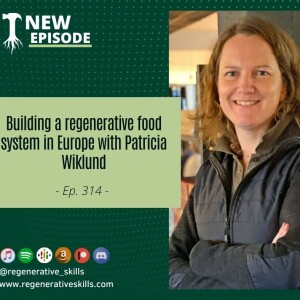
Friday Oct 13, 2023
Friday Oct 13, 2023
This week I want to build on the panel discussion that I started previously in the panel episode with the group from the Alpbach forum. In that conversation we looked at various visions on what a regenerative food system could look like from representatives from Nestle, Agrana, and a conservation farmer.
Today I want to bring another perspective into this idea of building healthy and resilient food systems from a friend of mine who has been working on this by connecting stakeholders throughout the entire food value chain in Finland.
Patricia Wiklund is the CEO of Invenire, a making ideas-happen-agency working with food & the bioeconomy, circularity, biodiversity & thriving rural landscapes. She has been instrumental in creating a “living laboratory” on the Åland Islands in southwest Finland. She is also a hub leader in the Baltic region of the Savory Institute Network promoting holistic land management, and a partner in Gens, a company working for upward spiraling farm life.
Patricia and I met almost two years ago during my work co-coordinating the first Climate Farming conference. She along with three other fascinating colleagues of hers from Finland attended the event and were my first window into the budding regenerative agriculture movement in that area of Europe, which I otherwise knew next to nothing about.
Since then I've been looking for an opportunity to follow up with her in order to see how their projects and collaborations develop. It turns out Patricia and her team have been advancing some fascinating experiments in connecting members all through the production, processing, and retail sides of the food web in her area and this is the main focus of our conversation in this session.
We also cover the challenges and opportunities of working in a small microcosm like the Åland islands where she works, and some of the advantages of dealing with food systems that haven’t yet been over developed and retain some of their traditional structures like local markets and diverse local production. Patricia also shares insights into how we can all work, in very tangible ways, to become active and participating citizens in our food systems instead of just consumers.
This session holds a lot of new insights and options for people who care to become more resilient on a community level in terms of food security in ways that have nothing to do with planting a veggie garden or becoming a farmer, many of which are relevant even to those of us who do produce food.









